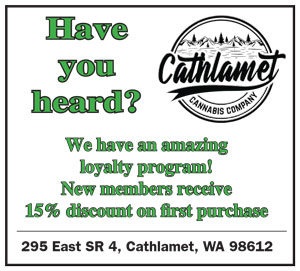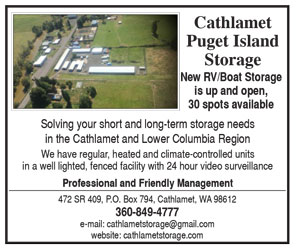ShoreBank CEO responds to comments on proposed National Heritage Area
May 13, 2010
Editor's note: John Berdes, president of ShoreBank Enterprise Cascadia, submitted this response to recent articles and letters to the editor regarding the proposal to form a national heritage area including Wahkiakum and parts of Pacific and Clatsop counties. Although it is much longer than we normally like for letters, we are running all of it because of the amount of public interest in the issue.
To The Eagle:
ShoreBank Enterprise Cascadia thanks and honors all citizens and elected officials who either attended public meetings on the feasibility study for the Columbia Pacific National Heritage Area or who submitted comments in writing. We appreciate the dialog, your passion, and your involvement. The public comment period ended Monday, May 3. We are summarizing and collating comments and will make them all available to everyone in the next few weeks on our website.
National Heritage Areas are not run by the federal government, but instead by local non-profit coordinators accountable to a local advisory board. Our organization, ShoreBank Enterprise Cascadia is the proposed coordinator for the Columbia Pacific National Heritage Area. We are a mission-based, 501(c)(3) charitable organization based in Ilwaco, Washington and Astoria, Oregon. We invest non-bank capital in people, places, and enterprises within the region.
During the past 18 months, we have been working with businesses, local leaders, interest groups, and members of the public on a proposal to designate the region surrounding the mouth of the Columbia River as the Columbia Pacific National Heritage Area. This process was a grassroots effort started by local citizens and Destination the Pacific around the time of the Lewis and Clark bicentennial celebration. For those who did not attend the recent public meetings, we would like to share with you what we hope to achieve through a National Heritage Area designation.
During our 15 years of work with fishers, farmers, loggers, and other entrepreneurs, we have recognized that the strength and identity of this place is our work, traditions, family ties, and special places in the woods, on the waterfront, and at the beach. Our goal for the NHA is to use it to help resource-based sectors of our economy, our cultural traditions, and tourism industry, survive and thrive in the 21st century, as these activities are at the core of our heritage and the key to our future. We believe that doing this requires specialized capital and investment. We have proposed to use the heritage area partnership program to develop a $10-15 million investment fund dedicated to supporting those enterprises, organizations, and individuals who have vision for a future economy built on the traditions that have defined us in the past. Our goal is to ensure that this area makes it to the 22nd century with its heritage and identity intact. For examples of what this work might look like, please visit our website and review a copy of the feasibility study.
Since Congress authorized the feasibility study, we have held over 55 meetings with diverse interest groups and government entities. Four additional public meetings were convened in April 2010 to present the first draft of the feasibility study. At all meetings, people expressed support for our proposed approach and for the shared history and heritage contained in the draft study. In Oregon, attendees at public meetings were overwhelmingly supportive of our proposal and NHA designation. In Washington, while people supported our proposal to invest in heritage, some were divided on the proposal to designate a National Heritage Area. Several people raised concerns that require our attention. In addition, we received some communications containing misinformation. Before responding to well-grounded concerns we must first clarify the misinformation.
First, ShoreBank Enterprise Cascadia is not a bank or a profit-making enterprise. We are a non-profit organization that makes non-bank capital available to assist the people and places we serve.
Second, the national heritage area designation is a community development program, not a federal “land grab” with a federal management plan, as some have characterized it. The NHA designation contains legal provisions that make it illegal for the National Park Service or the coordinator to use the program to influence or infringe upon property rights, or local or state government authority. There are 49 National Heritage Areas nationwide. They have been proposed and established by members of Congress from both political parties across a broad political spectrum.
A heritage area management plan is not a land management plan, but a financial management contract between the coordinator and the National Park Service, a guarantee that the coordinator must do what they say they are going to do with public funds. That is why we prefer to call it an implementation plan, not a management plan. This plan must be developed in full consultation and collaboration with residents, local governments, tribes, and businesses. This plan will not discuss land management in any way. We have never been involved in regulation, zoning, or land management, and we do not intend to start now. During our 15-year history, we have invested some $50 million in communities in amounts as small as $5,000 and as large as $10 million. We want the NHA resource to assist in doubling this amount to $100 million over the next five years. The community-based implementation plan will discuss how we do this through an NHA revolving loan fund.
The popularity and performance history of the NHA program has caused Congress to express concerns about self-sufficiency, basically asking “is this just another program that depends on federal grants year after year?” Our proposal contains a self-sufficiency plan – the first of its kind – and a proposal to produce measurable results in the form of jobs, new businesses, and products manufactured here instead of elsewhere. This NHA is saying to Congress “we will double your investment, put it all into heritage-based enterprises, earn our keep through hard work, and then recover the investments so they continue to produce the same measurable results.”
Some good people still have sincere concerns that this program will impact property rights and lead to more regulations. They are concerned that future elected bodies or groups of citizens will use the designation to argue for changes in zoning and other regulations. We take these concerns very seriously. It is clear from congressional debates on this issue that the designation was never intended to be used in this way. During the public meetings, we listened to these concerns and will include four provisions in the final feasibility study to ensure that this does not happen:
1. The latest heritage area bill recently passed by the House of Representatives contains provisions that allow any property owner to opt out of the heritage area boundary by sending a letter to the coordinator. We will insist that this language is included in any bill our delegation proposes. If it is not, we will not seek designation.
2. On April 23, 2010, the ShoreBank Enterprise Cascadia Board of Directors adopted a resolution prohibiting the organization from using the National Heritage Area designation to influence property rights or regulations in any way.
3. Based on comments during public meetings, we intend to assemble an advisory board that includes representation from elected governments within the region. The Board will consist of representatives from all three counties as well as heritage industries.
4. We will insist that the language found in other NHA’s referencing “inventory” of lands within the boundary be removed from the proposed CPNHA bill. The implementation plan will focus on economic opportunities and partnerships.
It is our hope that these measures will give concerned citizens the peace of mind necessary to help us focus on what this NHA proposal is about: the future of our region.
Though the public comment period for the draft feasibility study has ended the period for engagement on this issue has not. People and organizations who agree with what we have said here need to stand up and be counted by writing a letter and delivering it to SBEC at POB 826, Ilwaco or at Hanthorn Cannery, 100 39th Street, Suite 501, Astoria (or just drop it by because you know where we work). We promise to pass it along to elected local, state and federal representatives.
We extend an invitation to meet with any group or individual who wants to discuss the proposal further. We plan to continue this dialog as we move forward and stay connected to the communities the CPNHA program aims to serve.
John Berdes
President/CEO
ShoreBank Enterprise Cascadia












Reader Comments(0)